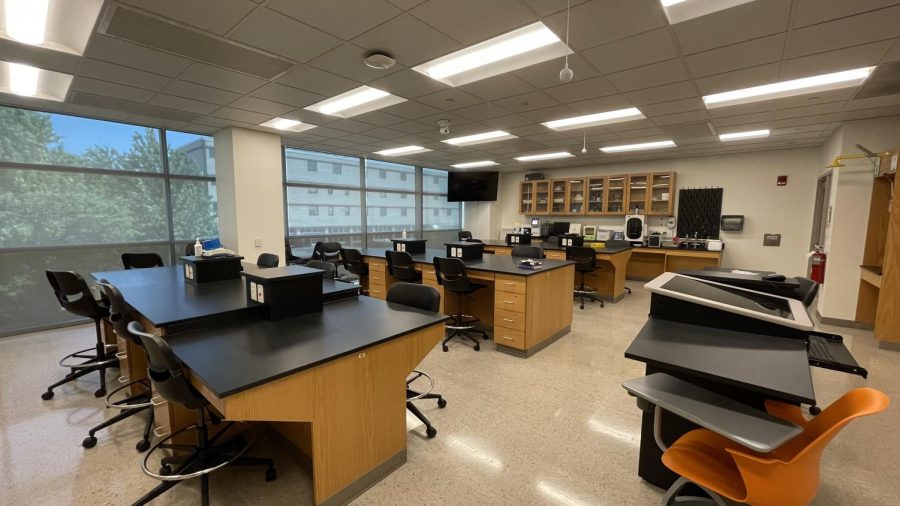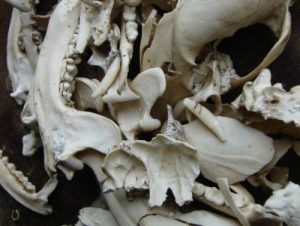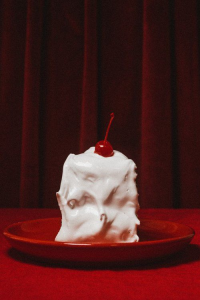The Biochemistry Major: A New Career Path for STEM Students
September 13, 2021
Starting this academic year, students at NJCU have a new option for an undergraduate major in Biochemistry. This major offers students a more interdisciplinary approach to their education, which is essential for students pursuing careers in the medical, pharmaceutical or research fields.
The program requires students to take the same introductory courses as Biology and Chemistry majors, as well as numerous advanced courses.
Biochemistry majors will also be taking a novel course sequence in chemistry, which includes General Chemistry I, two semesters of Organic Chemistry, and then General Chemistry II (in that particular order). This “organic sandwich” was designed by professors to help students who struggle with chemistry courses.
Dr. Yufeng Wei of NJCU’s Department of Chemistry led the development of the curriculum for the new program, working with faculty members from both the Chemistry and Biology Departments.
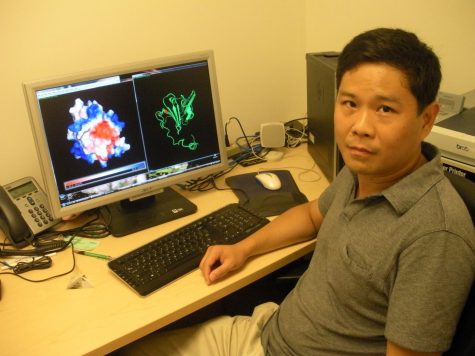
Wei described a collaborative effort his role played in the finalization of the program: “[I] had been working through the approval processes, both internal and external, to finalize the program… The program was a team effort within the Chemistry Department, and we had been in consultation with the Biology Department for its interdisciplinary nature. The Provost’s Office had provided guidance and support to secure State approval.”
Wei spoke highly of the educational opportunities that the Biochemistry program will provide for incoming freshman and current students considering changing their major: “We are able to incorporate novel concepts, advanced techniques, and experiential learning experiences into the curriculum. It will be a great program for students who are considering going into medicine, pharmacy, biomedical sciences, or life sciences in general, as it will provide students with strong biochemical foundations, biotechnology skills, and real-life research experience.”
The future of modern medicine and disease prevention depends on having well-trained interdisciplinary scientists. Wei explained, “The coronavirus pandemic places biochemistry at the center stage for the development of vaccines and therapeutics, and the market demands for biochemists will be strengthened as public consciousness of fighting emerging public health issues and crises increases.”
The process of establishing a biochemistry major was set in motion by student members of NJCU’s American Society for Biochemistry and Molecular Biology (ASBMB) organization, who met with the Chemistry and Biology Departments to discuss their academic needs.
Joyce Ikedife, president of ASBMB and junior Biochemistry major, said, “The coursework is very intensive. I’ve also heard from people who graduated from other schools with a biochemistry major that it’s better than having just biology or just chemistry. By having a biochemistry major you are open to so many industries. Before, I was a biology major and I planned to go to medical school, but then with biochemistry my career options are broadened…”
Sonali Rajurkar, a junior Biochemistry major and ASBMB member, described the purpose of the meeting with NJCU faculty and her perspective on the program. “In that meeting, they kind of asked us what fields we wanted to go into. Personally, I wanted to do research, so for me that’s very helpful, because that way I can also look at lifeforms in the biology field but also do a lot more chemical work. If we work together, we’ll understand how to cure other diseases faster rather than working in separate fields, so it’s a lot more combined and we have more opportunities to do such.”
Rajurkar explained her thought process for choosing to switch majors: “We’re actually benefiting more from getting a biochemistry major. Because if your degree says biochemistry, there are several benefits. One- it takes less time. Two- If you’re already in the biology or the chemistry field, all you have to do is take the opposite classes. Currently my major is Biology, so I’ve had a lot more biology classes and less chemistry, so now I just have to add on a few more chemistry classes. If you’re done with one side of it, you can just work on the other.”
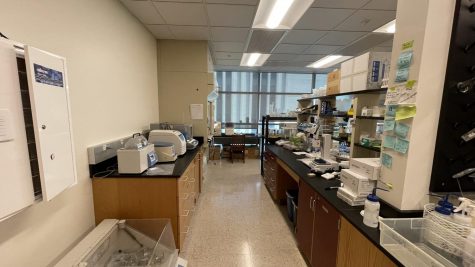
According to Wei, there may be some difficulties for students majoring in Biology and Chemistry who want to transfer to biochemistry, mostly because they may not have taken enough courses outside of their major. However, he reassured that faculty members will help students find their way: “We will help any students who are considering transfer into the biochemistry program, including accepting their biology or chemistry courses not required for biochemistry as electives, adding more students into chemistry courses or adding additional course sections so students can catch up with their course requirement, and running more required chemistry courses during summer sessions. Please contact me or the Chemistry Chair, Dr. Aslanian, if any students need help with their curriculum and courses.”
Ikedife advises students to carefully consider their options: “The main issue is trying to see if you can finish in four years if that’s your plan, because the coursework is really extensive. It’s like having a biology major and a chemistry minor. It’s either you have to take more classes per semester or if you make up your mind before you enter a freshman you can really plan out your classes and maybe be able to finish in four years. So for people who are a sophomore or entering junior year, I would advise them that they should take their time to see and they should plan their classes for a long period of time… the classes are really difficult.”
When asked what they would like to see from the department in the future, Ikedife explains “Because this is a new major, it’s merged with chemistry, it’s called the Chemistry/Biochemistry Department. Moving forward, I would love for us to have our own department. I believe with that, more opportunities will be open to students. Most employees or contractors from other schools, if they are reaching out to NJCU they will know that there is a Biochemistry Department, and it’s not paired with chemistry or any other department.”
With various additional pathways to professions, students can look into different STEM industry opportunities.



